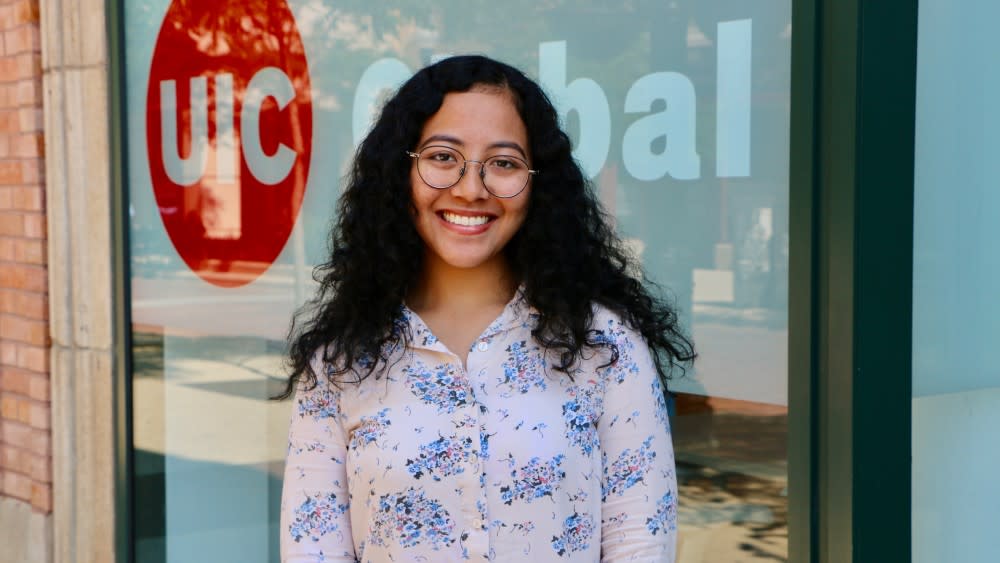For as long as Lila can remember, she wanted to study abroad for a chemical engineering degree. She looked at numerous schools known for engineering, but because she wanted to live in an American city, the University of Illinois Chicago became a top choice.
“Chicago seemed like such a cool place,” she recalls, noting that UIC is ranked well for engineering and known for research.
The College of Engineering’s Guaranteed Paid Internship Program (GPIP) for freshmen also made UIC really stand out.
“Back home in Indonesia, we do not do internships until after college,” explains Lila. “So, I felt I had zero experience coming to the States. My resume was completely empty.”
Through the program, she worked in a chemical engineering research lab on campus alongside PhD students and professors. The work she did contributed to a research paper that her team is currently trying to get published. The hands-on experience allowed Lila to build her resume, giving her the confidence to look for internships off the UIC campus.
Landing an Internship During the Coronavirus Pandemic
During the spring semester of 2020, Lila went to a UIC career fair. “I basically looked at all the companies looking for chemical engineers who can sponsor F-1 students,” she remembers. “I did my research on the companies and visited the one I was really interested in and gave them my resume.”
The company, Koppers, is a “large scale version of what I did in the lab,” explains Lila. They emailed her after the event saying they were interested, and she went to the company for an on-site interview.
“During the interview, my supervisor introduced me to every single one of the engineers,” Lila explains. “I was getting hired as a process engineer, but I would be working with the mechanical, electrical, and other engineers.”
The afternoon was long, and Lila remembers interviewing with at least six to seven people, moving from room to room, and getting a brief tour of the plant. “My adrenaline was high, and I was more scared than I needed to be. Everyone was super friendly and it was not as formal as I thought it would be.”
She notes that they did not ask her anything about her resume or GPA, and genuinely wanted to know how Koppers could support her. “They care about their interns,” she says.
Shortly after the interview, Lila found out that she got the internship for summer 2020. Then, COVID-19 started to shift UIC classes online and Lila had to decide if she was going to stay in Chicago or return home.
“Most of my friends were going back to their home countries,” she remembers. “I remember thinking, ‘I can’t let this opportunity go. I need to do this.’” With support from her family, she decided to stay in Chicago.
Safely Working In Person
In the spring of 2020, Lila was not sure the internship would move forward, but in May she heard from the company saying they still wanted her to join their team.
Over 10 weeks, Lila commuted from UIC to the Koppers plant just outside the city. Upon arrival, she had her temperature checked and wore a mask, except when she was in her cubicle. She emphasizes that she felt safe and that the company was following specific safety protocols to comply with COVID regulations. Free masks and hand sanitizer were available to everyone, and every room had masks and hand sanitizer available.
“With a chemical plant, you can’t really take care of it remotely, since you need to physically see it,” she says, emphasizing the importance of being able to do her internship in person. “It is a really big place, so social distancing was easy.”
“Meetings had no more than three to five people very spaced apart, and often would [be on] Microsoft Teams,” she continues. “We really limited the amount of physical contact we had among one another.”
The engineering team had fewer than a dozen people, making it easy for Lila to know everyone she worked with. When one engineer came into contact with someone with COVID-19, it was easy to reach everyone on the team quickly and determine who had talked to that individual, and then follow up with testing.
For other international students interested in pursuing in-person internships, she suggests reaching out to departmental and/or human resource managers to get all questions addressed and feel as comfortable as possible.
How International Students Can Find Internships
Beyond knowing which companies hire students on F-1 visas, Lila also recommends that students make sure the companies they want to work with are aware of curricular practical training (CPT) status. “You can’t work off campus without the paperwork,” explains Lila.
Since a lot of job recruiting is online, Lila says international students should actively sign up and look for opportunities available online. And while she points out there are many virtual internships, she still recommends looking for in-person internships, too. Again, getting information early is key. Find out how companies are enforcing safety regulations and taking care of their employees.
“Know your resources and use them well,” Lila concludes, citing the extra work international students have to do compared to domestic students. “Reach out to the career center at your school and your professors to see if they are aware of additional opportunities. A lot of professors post internship and research opportunities.”
Whether your internship is in person or virtual, Lila emphasizes the need to connect with as many people as you can. “Connect on LinkedIn, start messaging people you know, keep in touch with employers — stay active!”
Discover how Shorelight can help you find an internship >

